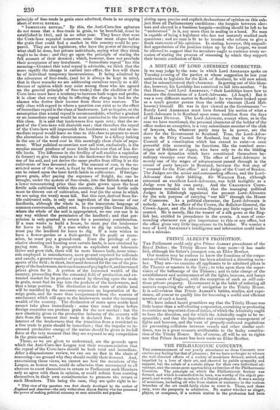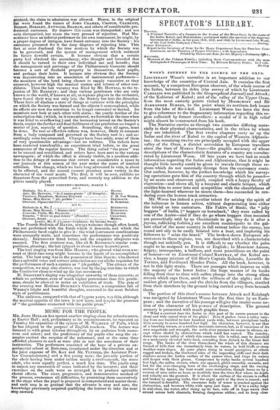THE PHILHARMONIC CONCERTS.
THE commencement of our yearly attendance on these Concerts now excites any feeling but that of pleasure ; for we have no longer to witness the well-directed efforts of a society of musicians formed, united, and. impelled by a love of their art, and cheered by public sympathy and support, but the cabals of a certain clique for their own individual ad- vantage, and the consequent approaching extinction of the Philharmonic Concerts. The principle on which the Philharmonic Society was formed, and which is embodied in its laws, was worthy of the object pro- posed, and worthy of the members of a liberal profession. It was a society of musicians, including all who from station or eminence in the various branches of the art could fairly claim to enter it. These, and these only, were the passports to admission. No matter whether as singer, player, or composer, if a certain station in the profession had been attained, the claim to admission was allowed. Hence, in the original list were found the names of JOHN CRAMER, CROTCH, CLEatzbizr, BISHOP, HORSLEY, ATTWOOD, BRAMAN, and others of considerable pro- fessional eminence. By dezreea this claim was disregarded ; and not only disregarded, but made the very ground of rejection. Had Mo- scaELEs been an inferior performer on his own instrument, he might, by a proper degree of intrigue, have found entrance into the Society : his eminence procured for it the deep disgrace of rejecting him. This faet at once disclosed the true motives by which the Society was to be governed, and the system of management which rendered its future downfal certain. It became obvious that a certain party had obtained the ascendancy, who thought and intended that it should be turned to their own individual use and benefit ; that the management and patronage of the Philharmonic Concerts should become a sort of freehold property to themselves, their pupils, and perhaps their heirs. It became also obvious that the Society was degenerating into an association of instrumental performers— the members of the band being chosen to supply vacancies as they occurred, however high the musical station and talents of other can- didates. Thus the last vacancy was filled by Mr. HOWELL, to the re- jection of Mr. BARNETT ; and thus various gentlemen who are only known to the world, if known at all, as repieno players in the orchestra, have found their way not only into the Society but into the direction. These facts all disclose a state of things at variance with the principles on which the Society was formed and the objects it contemplated, while its effects are now too notorious to be longer concealed or denied. Its members now look at each other with alarm : the yearly decline of the subscription-list, (which, be it remembered, we foretold at the time when it was filled to overflowing,) and the increasing inroad on the Society's funds, render the further and final fulfilment of our prediction no longer a matter of jest, scarcely of question. Something, they all agree, must be done. No real or effective reform was, however, likely to emanate from a body composed and governed as the Society now is ; and ac- cordingly none has emanated. Changes have been made, some of them of very questionable advantage—but no reforms. The tickets have been rendered transferable; an experiment tried before, to the great annoyance of the regular hearers. The thing called "the press" was to be coaxed and conciliated, and orders have been sent to the various newspapers; of which the effect is already visible, in a needless addi- tion to the deluge of nonsense that covers so considerable a space in our journals at this season of the year under the name of musical criticism. One change, which we have long advocated in vain, is about to be effected, and the second concert promises some variety in the character of the vocal music. The first, it will be seen, exhibits no departure from the prescribed form, and scarcely any addition to the pieces usually played.
FIRST CONCERT—MONDAY, MARCH 1.
ACT I.
Sinfonia, No. 4 HAYDN.
Aria, Mr. 'Infuser, " Se ii nostro pianto " (II Seraglio) MOZART.
-Concert o, Pianoforte. Madame DULCKEN C. M. VON WEBER.
Scene, Miss BIRCH. " Ah, perlido " BEETHOVEN. Overture, Ulysses and Circe B. ROMBERG. ACT II.
Sinfonia in A, No. 7 BEETHOVEN.
Seems., Miss Memos% " Sommo del." ZINOARELLZ.
Concerto, Violin, Mr. DELOFFRE. MAYSEDER.
Tersetto, " Dolce ne gnat ristoro " (Fattish) CHERUBIM.
Overture. Joseph Leader. Mr. F. CRAMER—Conductor, Sir GEORGE SMART.
The Fourth Sinfonia of HAYDN, always welcome though often heard, was not performed with the finish which it demands, and which the Philharmonic band ought to give it : the wind instrument combinations were unequally made, and sometimes the performance was positively slovenly. BEETHOVEN fared better, and the exquisite allegretto was encored. The first overture was, like all B. R03113ERG'S similar com- positions, pleasing ; the last (played to about twenty hearers) poor. The best singing was from Miss Massing ; who proved w hat even a se- cond or third-rate song might become in the hands of an accomplished artist. The best song was in the possession of Miss BIRCH ; who showed that a splendid voice and correct articulation are not all the requisites for the performance of such a cantata as " Ah perfido." The climax of the composition, we may also observe, was lost by the jog-trot time in which the Conductor chose to wind up the last movement.
M. DELOFFRE'S display was altogether unworthy of these concerts; at which no performer, even of much higher pretensions than this gentle- man, should be allowed to make an exhibition of trash. The gem of the evening was Madame DEMURER'S Concerto ; a composition full of WEBER'S bright and beautiful thoughts, executed in the most finished style of performance. The audience, compared with that of bygone years, was thin, although the musical appetite of the town is now keen, and despite the presence of " the gentlemen connected with the public press."



























 Previous page
Previous page